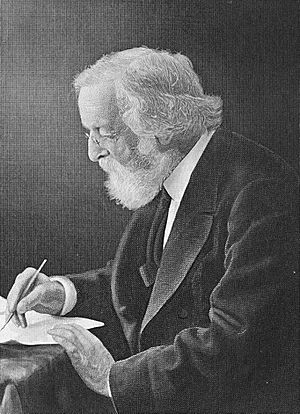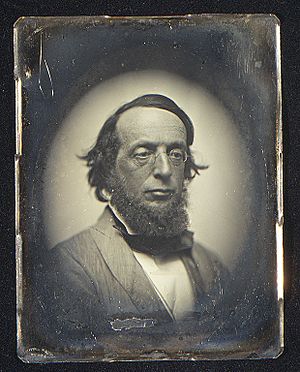James Freeman Clarke facts for kids
Quick facts for kids
James Freeman Clarke
|
|
|---|---|
 |
|
| Born | April 4, 1810 Hanover, New Hampshire |
| Died | June 8, 1888 Jamaica Plain, Boston, Massachusetts |
| Occupation | Minister, theologian, writer, editor, abolitionist |
| Alma mater |
|
| Relatives | James Freeman (clergyman) (grandfather) |
| Signature | |
James Freeman Clarke (born April 4, 1810 – died June 8, 1888) was an important American minister, writer, and thinker. He was known for his strong beliefs in human rights and his work to end slavery.
Contents
Life Story
James Freeman Clarke was born in Hanover, New Hampshire, on April 4, 1810. His grandfather, James Freeman, who was a minister in Boston, raised him. James went to the Boston Latin School. Later, he studied at Harvard College and Harvard Divinity School. He finished his studies in 1829 and 1833.
Becoming a Minister
After finishing school, James became a minister in the Unitarian church. His first church was in Louisville, Kentucky. At that time, Kentucky was a "slave state," meaning slavery was allowed there. James quickly joined the national movement to end slavery, called abolitionism.
His ideas were sometimes very new for the time. Some people found his sermons (religious talks) surprising. He once wrote that he felt like a "broken-winged hawk," trying to reach high goals but struggling.
Starting a New Church
In 1839, James Freeman Clarke moved back to Boston. There, he and his friends started a new church in 1841. It was called the Church of the Disciples. This church aimed to use Christian teachings to solve the social problems of the day.
A special thing about his church was James's belief that everyone was a minister. He thought that being ordained (officially made a minister) didn't make him better than anyone else. He served as the minister for this church from 1841 to 1850 and again from 1854 until he died. He also taught at Harvard from 1867 to 1871.
His Writings
James Freeman Clarke wrote many essays for different magazines. These included The Christian Examiner and Atlantic Monthly. He also published 28 books and over 120 pamphlets. These included sermons, speeches, and hymnals.
He was the editor of a magazine called Western Messenger. This magazine shared liberal religious ideas. It also strongly supported ending slavery. This magazine is now valuable because it printed some of the first poems by Ralph Waldo Emerson. Emerson was a personal friend and a distant cousin of Clarke. James also joined the Transcendental Club with Emerson and others. This group explored new ideas about spirituality and philosophy.
Working with Margaret Fuller
For the Western Messenger, Clarke asked Margaret Fuller to write for him. He published her first literary review. This was a criticism of biographies about George Crabbe and Hannah More. Margaret Fuller later became a famous writer herself.
After Margaret Fuller died in 1850, Clarke helped edit her memoirs. He worked with William Henry Channing and Emerson on this project. They published The Memoirs of Margaret Fuller Ossoli in 1852. The book was very popular and sold many copies.
During the Civil War
In 1855, Clarke bought the land where Brook Farm used to be. He hoped to start a new community there, but it never happened. Instead, during the American Civil War, he offered the land to President Abraham Lincoln. The Second Massachusetts Regiment used it for training soldiers. They called it "Camp Andrew."
In 1861, Clarke was in Washington, D.C. He was with Samuel Gridley Howe and Julia Ward Howe. After hearing the song "John Brown's Body", he suggested that Mrs. Howe write new lyrics. This led to the famous song "Battle Hymn of the Republic".
In 1871, Boston celebrated Italian unification. James Freeman Clarke wrote a poem for the event. It was called "A Hymn for the Celebration of Italian Unity." In 1874, he became a member of the American Philosophical Society.
A painting of James Freeman Clarke hangs in the Boston Public Library. It was painted by Edwin Tryon Billings.
His Beliefs
James Freeman Clarke strongly believed in human rights for everyone. He was a reformer who wanted to make society better. He was also a conciliator, meaning he tried to bring people together.
Women's Rights
Clarke supported women's right to vote. After he died, a statement he wrote was published. In it, he said that giving women the right to vote was very important. He believed it was not just a political issue, but also a social, moral, and religious one.
Religious Views
Clarke wrote a famous book called Ten Great Religions (published in two parts, 1871–1883). He was one of the first Americans to study and write about religions from Eastern countries. He wanted to create a broader understanding of religion. He felt that many people were still too influenced by older, stricter religious ideas.
Selected Writings
- Steps of Belief: Or, Rational Christianity Maintained Against Atheism, Free Religion, and Romanism (1870)
- "Common Sense in Religion" (1874)
- Essentials and Non-Essentials in Religion: Six Lectures Delivered in the Music Hall, Boston (1878)
- "Self-Culture: Physical, Intellectual, Moral, and Spiritual" (1880)
- "Memorial and Biographical Sketches" (1880)
- Every-Day Religion (1886)
- Sermons on the Lord's Prayer (1888)
- "Autobiography, Diary and Correspondence" (1891)
 | Lonnie Johnson |
 | Granville Woods |
 | Lewis Howard Latimer |
 | James West |


